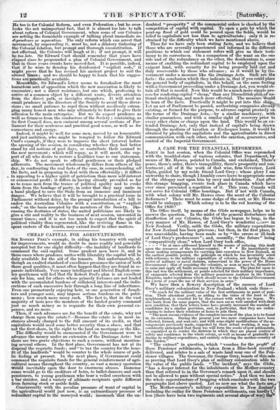'CHEAP CAPITAL FOR AGRICULTURISTS.
Sin ROBERT PnnL's example, in aiding his tenantry with capital for improvements, would no doubt be more readily and generally accepted but for one slight difficulty—the inability of landlords to eommand the said capital. Some prudent men have it, and in those cases where prudence unites with liberality the capital will be duly available for the aid of the tenants. But unfortunately, al- though an exalted standard of excellence presumes the union of both those good qualities, it must often happen that they are found in se- parate individuals. Very many intelligent and liberal English coun- try gentlemen will feel that Sir Robert Peel's plan is an excellent one for him, and for others whose princely fortunes are not loaded with the accumulated burdens of collateral interests and the indis- cretions of each successive heir through a long line of inheritance. Even one prematurely enjoying heir, or one generation of daugh- ters and younger sons, may impose serious burdens on the patri- mony; ; how mu more many such. The fact is, that in the vast majority of insts cos the members of the landed gentry command just as much m ney as is requisite for their own personal ex- penses, and no more. Then, if such advances are for the benefit of the estate, why not charge them upon the estate P—Because the estate is in most in- stances already charged to the full amount of its credit, so that capitalists would need some better security than a share, and that not the fusb share, in the right to the land on mortgage or the like.
The difficulty would be surmounted if the Government were to advance the money under an extension of the Drainage Acts : but there are two grave objections to such a course, without mention- ing several others. In the first place, Government has not at its disposal the requisite funds; and" to tax the country for the bene- fit of the landlords" would be counter to the whole course of pub- lic feeling at present. In the next place, if Government could command the requisite funds for the general reinforcement of agri- cultural means throughout the country, so vast a money operation would inevitably open the door to enormous abuses. Immense sums would go to the creditors of heirs, to ballet-dancers and such pensioners, to young gentlemen who bear a veiled escocheon with a bar sinister, and a variety of ultimate recipients quite different from farming stock or arable fields.
Concurrently with the peculiar pressure of want of capital in the agricultural world just now, is an extraordinary, pressure of redundant capital in the moneyed world; insomuch that the un-
doubted " prosperity " of the commercial orders is checked by the competition of capital with capital. To open a gate by which the pent-up flood of gold could be poured upon the fields, would be relief to capitalists not less than to agriculturists ; only it is re- strained by the difficulty which we have mentioned above.
Thus far we have only been stating facts, and we believe that those who are severally experienced and informed in the different positions to which our statement refers will give us their testi- mony to its correctness. On a comparison of the want on the one side and of the redundancy on the other, the desideratum is, some means of enabling the redundant capital to be employed upon the exigent land, with security for its being properly laid out and duly recoverable by those who advance ; as it would be by Go- vernment under a measure like the Drainage Acts. Such are the facts : the conclusion which they indicate is, that if you could place the general body of capitalists, in this behalf, on the same footing with a Government proceeding under a Drainage Act, you would ob- tain all that is needed. Now this would be a much more simple pro- cess for rendering capital " cheap," than any Disraelitish plan of-na- tional stockjobbing, and much more effectual. The measure would be born of the facts. Practically it might be put into this shap...., Let an act of Parliament be passed, authorizing companies already' existing, or formed for the purpose, to advance capital precisely on the terms of the Drainage Acts,—by a similar machinery, with similar guarantees, and with a similar right of recovery prior to every other claim or charge upon the land. This would be an ex- tended Drainage Act, only that instead of capital's being drawn through the medium of taxation or Exchequer loans, it would be obtained by placing the capitalists and the agriculturists in direct communication with each other, under the sanction, guarantee, and control of the Imperial Government.






























 Previous page
Previous page